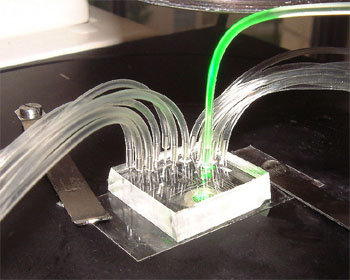
 |
New! Check out Micado, an AutoCAD plugin for automatic routing and GUI generation for programmable microfluidic chips (March 2008).
| Chip Operations | Transport and Storage Primitives | ||||
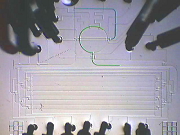 |
Mix-and-store. Using a programmable microfluidic device, two samples are loaded into a rotary mixer, mixed to homogeneity, and stored in a storage cell. In this device, samples are isolated from one another using a continuous phase (oil). |
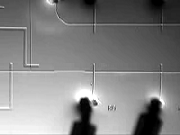
|
Microfluidic latch. The microfluidic latch enables a fluid sample to be aligned to a given location on a microfluidic device. By partially deflecting a control valve, the latch catches an aqueous sample while allowing the background oil phase to freely pass. This enables programmability and scalability, as samples can be moved reliably from one location to another without depending on precise timing or external feedback. | ||
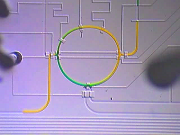
|
Mixing (close-up). A close-up of the rotary mixer during operation of the device. Unit-sized samples are loaded on opposite sides of the mixer, and the mixed result is transported to storage. The control software automatically derives complex mixtures using a sequence of these simple equal-proportion mixes. |
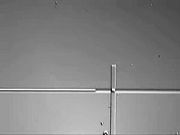
|
Microfluidic latch (close-up). Close-up video of the microfluidic latch as decribed above. For additional details on the latch, see our Lab-on-a-Chip paper. | ||

|
Mix-and-store (alternate device). In this device, samples are separated by air rather than oil. This allows faster fluid transport, though channels must be cleaned with water between operations. Mixing is accomplished during transport of samples from a metering device to the storage cells. |
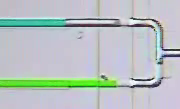
|
Storage alignment (alternate device). When samples are separated by air rather than oil, a sample can be aligned with the end of a closed storage cell by simply purging the air into the PDMS device. | ||
The BioStream software (described in our Lab-on-a-Chip paper) provides a high-level programming environment for designing, simulating, and executing complex biology experiments on microfluidic chips. The source code for BioStream is freely available. For a pointer to the most recent version, please send email to Bill Thies (thies@mit.edu). In the future, a release bundle will be posted on this webpage.
thies@mit.edu